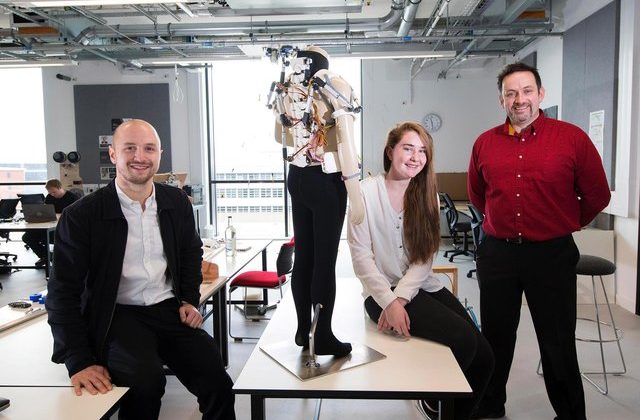
A young Burnley student’s engineering project to create an exoskeleton jacket for her cousin, who has spinal muscular atrophy, has won a major award at COP26.
Krystyna Marshall was aged 15 and attending Sir John Thursby Community College in Burnley when she teamed up with engineers from the University of Central Lancashire (UCLan) to turn her idea for the exoskeleton jacket into reality. The jacket is designed to enable Krystyna’s cousin to live a more conventional life by providing skeletal support and extra strength to the back muscles and spine.
The young inventor was one of six people from across the UK to be recognised as a leading creative problem solver in engineering innovation through the award of the inaugural Primary Engineer MacRobert Medal. The medal recognises and celebrates the innovations of young people aged between three and 19, as well as the university teams that have helped the young innovators to make their ideas a reality. The new award, the winners of which were announced at the recent COP26 gathering in Glasgow, is supported by the MacRobert Trust, WEIR Group and the RAF Charitable Trust.
The winners receive either a gold, silver or bronze medal for their designs, most of which have been inspired by the young person’s personal experiences and aspirations for the environment, health or other key topics. Krystyna’s invention was one of only three to win gold.
‘As a team we’re absolutely delighted to be named an inaugural winner of the 2021 Primary Engineer MacRobert Medal,’ said Matthew Dickinson, a senior lecturer in mechanical engineering at UCLan, who was part of the team that produced the ground-breaking jacket. ‘It just goes to show what can be achieved when a great idea is turned into reality through an innovative engineered solution.
‘We are still working on the jacket and developing new applications that utilise the same 3D-printed technology, but what’s really exciting is to know we’ve all played a part in producing something that could have life-changing consequences for potentially thousands of people worldwide,’ he continued.
‘We are very proud to have the link to The MacRobert Trust and their legacy of celebrating the very best in engineering. And we are grateful to WEIR Group and RAFCT for enabling us to establish this medal,’ said Susan Scurlock, CEO and Founder of Primary Engineer. ‘I also would like to thank the judges; this was not an easy task, but a hugely inspiring one! Through the Primary Engineer MacRobert Medal we are now able to highlight the link between universities and schools celebrating the creativity in young people and the proto-teams engineering their solutions.’
The medal forms part of the wider ‘If you were an engineer, what would you do?’ national competition that encourages young people to interview engineers, find a problem and draw and annotate a solution to it. Every entry is read and graded by engineers, and all participants receive a certificate. Exhibitions are held and awards presented in 18 different locations across the UK.



